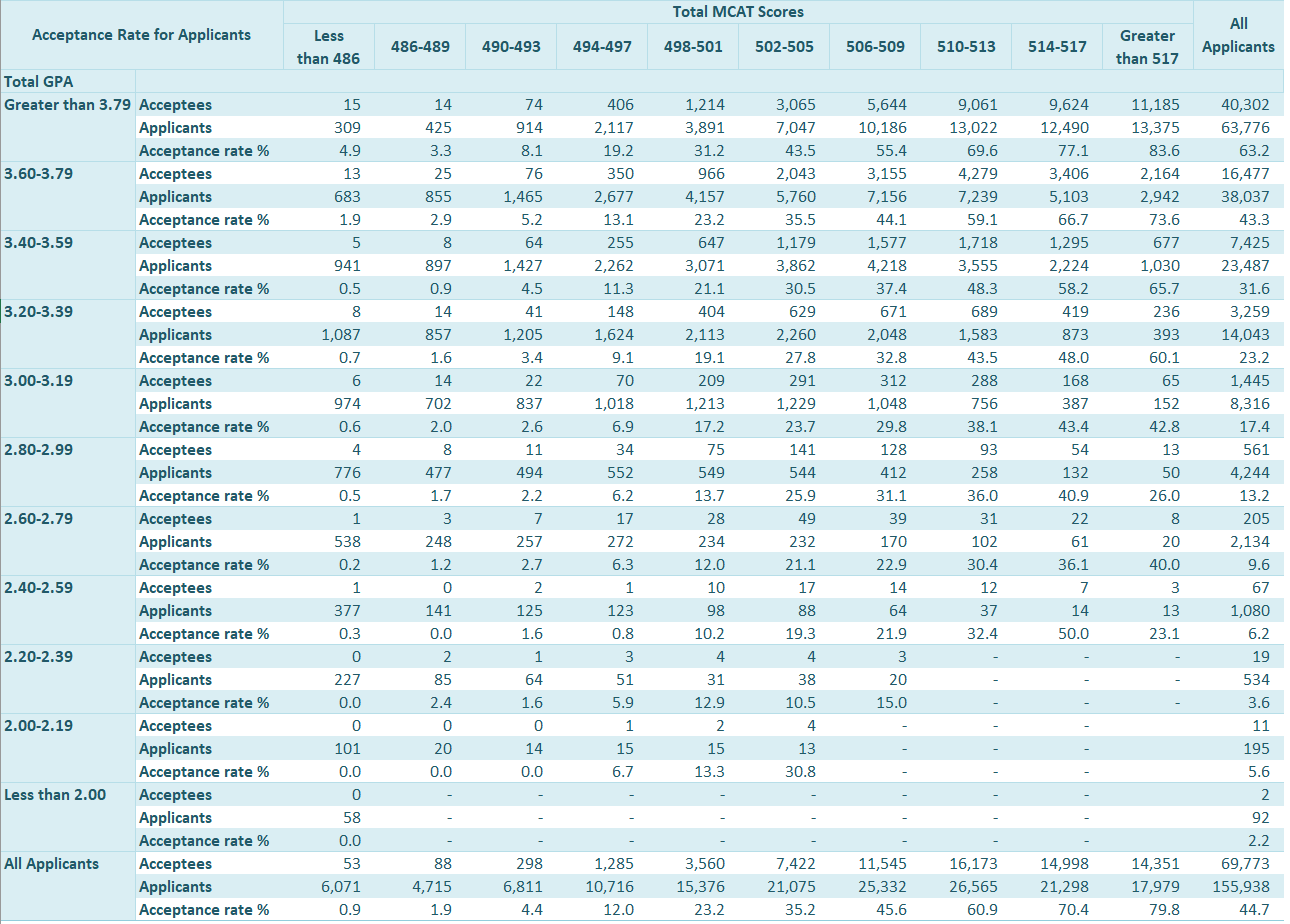Medical school consultants help applicants with low MCAT scores boost their chances of admission by emphasizing strengths in other areas and strategically reframing any weaknesses.
This article breaks down how consultants support low-scoring applicants and recommends three top firms worth considering.
Understanding the Impact of a Low MCAT Score In the Med School Admissions Process
A low MCAT score can drastically impact your chances of admission to med school. However, in today’s holistic admissions landscape, admissions committees evaluate MCAT scores in the context of other aspects of an applicant’s profile.
Last year, the national average MCAT score for medical school applicants was 506.1, according to the AAMC. That means anything significantly below 506 will likely be considered a red flag, especially at top medical schools.
But that doesn’t mean your acceptance chances drop to zero.
Admissions committees assess MCAT scores alongside everything else in your file, such as your GPA, coursework, research, clinical experience, essays, and more. A lower MCAT score can be offset if the rest of your application proves you’re ready for medical school. For example, a 501 MCAT paired with a 3.9 GPA in a rigorous science major and hundreds of clinical hours may still land you an interview.
However, it will still be challenging to get accepted with an MCAT score below the national average. With a 506.1 MCAT score and a 3.66 GPA, your acceptance odds hover around 44.1%, according to the AAMC data visualized in the screenshot below.

With a 500 MCAT score and the same 3.66 GPA, your med school acceptance chances drop to 35.5%. Anything below a 500 MCAT score means you’re likely facing acceptance rates ranging from as high as 23.2% to as low as 13.3%.
The MCAT is the only standardized benchmark across all applicants. But it’s not the only thing that matters. Consultants can help you offset a low MCAT score if you choose someone knowledgeable and reliable.
6 Ways Medical School Consultants Help Applicants With a Low MCAT Score Get Into Medical School
Consultants know how to position your application so your low MCAT score doesn’t overshadow everything else. They also help you decide whether it makes sense to retake the test, apply with your current score, or adjust your school list. In a high-stakes, high-rejection environment, that kind of guidance can be the difference between a wasted cycle and a real shot at getting in.
Here are 6 ways a reliable medical school consultant can help you get into medical school, despite a low MCAT score.
1. Strategic School Selection
Most applicants apply too broadly or unrealistically, especially when trying to overcome a low MCAT score. Consultants analyze admissions trends, class profiles, mission statements, and MCAT ranges to help you create a school list where you have a better chance of acceptance. That includes identifying programs that:
- Use a holistic admissions process and don’t over-index on MCAT scores
- Prioritize mission alignment, underserved backgrounds, or life experiences
- Value clinical work, research, or non-traditional paths over perfect test scores
- Offer special pathways or diversity-focused programs where your profile fits
With a counselor’s help, you’ll avoid wasting time and thousands of dollars on secondaries from schools where your MCAT score reduces your chances of acceptance. Instead, you’ll apply smart, with intention and a clear rationale behind every target.
2. Academic Narrative Reframing in Your Personal Statement
You can’t just hope no one notices your low MCAT score. Consultants help you proactively address academic concerns through the personal statement without turning it into a justification or apology. They’ll guide you to:
- Show academic growth, motivation, and maturity through your undergraduate education
- Tie the academic challenges to the turning points that shaped your motivation for medicine
- Emphasize real intellectual curiosity through your clinical, research, or volunteer experiences
- Build trust in your ability to handle medical school through authentic storytelling
The right consultant will help you position your background strategically so admissions committees see the full picture beyond numbers.
3. Help Strengthen Every Other Aspect of Your Application, Including Your GPA
You need your entire application to be above-average with a low MCAT score. Consultants get to know your academic record, extracurriculars, and work history to find overlooked strengths and identify gaps you can fill quickly. That includes:
- Evaluating your GPA by trend, course rigor, and science-specific performance
- Highlighting upward trends or academic increases that show improvement
- Recommending final coursework to boost your science GPA before applying
- Helping you extract meaningful insights and impact from clinical, volunteer, and research roles
- Positioning shadowing and leadership experiences as indicators of readiness for medical school
When executed correctly, these components can shift the narrative and help admissions committees see that you’re ready for medical school.
4. Expert Secondary Essay Editing
Secondary applications are where strong applicants often lose their chance of standing out, especially if the essay is rushed, written poorly, or fails to highlight an applicant’s strengths. Consultants help you turn secondaries into the key to your acceptance by:
- Personalizing each essay to a school’s mission, strengths, and community values
- Addressing your MCAT score only when necessary, and in a way that adds value
- Avoiding red flags like inconsistent messaging, filler content, or vague goals
- Tightening your writing to stay within character/word limits
- Structuring your responses so they add new, important information
If your MCAT raised questions, your secondaries need to provide the answers, and consultants make sure they do.
5. Unlimited Guidance From Former Admissions Officers
Working with someone who’s actually made med school admissions decisions is a major advantage. Consultants who are former admissions officers know:
- What schools actually look for beyond stats
- How low MCAT scores are weighed relative to other factors
- Which narratives are compelling, and which raise red flags
- How to stand out in interviews when your numbers don’t
With unlimited access to your counselor, you’ll get direct, honest feedback on every part of your application with a level of strategy that most students never receive.
3 Best Medical School Consultants for Applicants With a Low MCAT Score
1. Inspira Advantage
Inspira Advantage is the best medical school admissions consultant for applicants with a low MCAT score, with over 15 years of experience, 37,000 coaching hours, and a 98% success rate. Here’s why Inspira Advantage ranks at the top of our list:
- Nation’s Largest Team of Former Admissions Officers: Work with 525+ scoring tutors, many of whom are former admissions officers at top medical schools.
- MCAT Tutoring Bundle Packages: Combine MCAT prep with a 515+ score guarantee with admissions consulting to strengthen your application and offset MCAT concerns.
- Personalized Tutoring Strategy: Tutors use flexible scheduling to understand who you are as a person before diving into each personalized tutoring session.
- Unlimited Feedback: Tutors help you understand your weaknesses and turn them into strengths in all areas of the MCAT.
- 515+ Score Guarantee: Inspira Advantage offers a 515+ score guarantee, which aligns with what’s considered a competitive MCAT score for around 94% of U.S. medical schools.
- School List Strategy Based on MCAT Benchmarks: Get help building a strategic list of reach, target, and safety schools based on actual MCAT/GPA data and historic student success rates.
- Scholarship Awards: Students receive an average of $140,000 in scholarship awards across four years.
- Alternative Low MCAT Score Support Options: Inspira Advantage offers a free MCAT practice test, downloadable MCAT guides, and free MCAT workshops designed to help test-takers become top scorers in weeks.
Why Is Inspira the #1 Choice For Applicants With Low MCAT Scores?
Inspira Advantage is the top choice for applicants with low MCAT scores due to their evidence of success working with students with below-average MCAT scores. For example, Jonah was accepted to George Washington University School of Medicine with a 508 MCAT score, six points below the school’s 514 average, after working with his expert consultant.
In a written review, Prithvi highlighted “Inspira helped me get accepted to four schools with a below-average GPA and a mediocre MCAT score,” noting admission to Georgetown School of Medicine.
Inspira Advantage also helped Ankita increase her MCAT score by 12 points.
How I Improved My MCAT Score by 12 Points | Inspira Advantage
In Ankita’s video review, she highlighted:
“My MCAT score improved by 12 points between the two tests I took … Not only did I score 4 points higher than my goal score, but I got a score that was even better than I possibly imagined I could ever get.”
2. PreMedMentors
PreMedMentors provides support for applicants with a low MCAT score. Their services include:
- Expert Mentorship: MCAT support delivered by experts in the industry.
- Comprehensive Services: Offers help with school selection, essay editing, mock interviews, and MCAT prep.
- Flexible Scheduling Options: Students can choose between hourly support or more structured packages.
PreMedMentors’s medical background focus makes it appealing for those needing support with academic positioning.
3. MedLife Mastery
MedLife Mastery provides support for students looking to increase their MCAT scores. Their services include:
- Expert Tutoring: Focus on test-taking psychology, question breakdowns, and efficient study systems
- Advice for Study Sessions: Coaches advise on what areas to study for the MCAT
- Flexible Packages: Offers flexible plans for the support you’re looking for
MedLife Mastery is a great choice for students who need to work on improving their MCAT scores.
Alternative Low MCAT Score Support Options
If hiring a consultant isn’t in your budget right now, that doesn’t mean you’re out of options. There are high-quality, low-cost (and in many cases, completely free) resources that can help you improve your MCAT performance or strengthen your overall application strategy.
1. MCAT Practice Tests
One of the most important things you can do to improve your MCAT score is to take a full-length, high-quality MCAT practice test under realistic conditions. A good MCAT test simulates the actual 3-hour exam and helps you pinpoint your weaknesses.
2. Downloadable MCAT Study Tips Guides
Downloadable MCAT guides are a great way to get structured advice without paying for a course. But some guides are overfilled with filler or outdated tips. Look for downloadable resources created by experts who actually understand what it takes to succeed.
3. Free MCAT Workshops
Live or recorded MCAT workshops can give you a clearer picture of what’s working in your prep and what’s not. Good workshops go beyond generic content review. They show you how to think like the test-maker, manage time, and avoid common traps that drag down your score.

























































































































